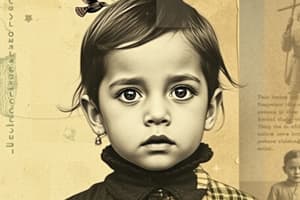Podcast
Questions and Answers
What does Article 31 of the UNCRC establish for children?
What does Article 31 of the UNCRC establish for children?
- Right to healthcare without discrimination
- Right to education suitable to the age and abilities of the child
- Right to free time for religious activities
- Right to recreational activities suitable to the age and abilities of the child (correct)
According to Article 16 of the UNCRC, what are children entitled to, regardless of family composition?
According to Article 16 of the UNCRC, what are children entitled to, regardless of family composition?
- The right to choose their caregivers
- The right to maintain personal relations with both parents and extended family (correct)
- The right to financial support
- The right to live independently
What does Article 19 of the UNCRC emphasize in relation to children?
What does Article 19 of the UNCRC emphasize in relation to children?
- Unrestricted access to technology
- Access to quality education
- Freedom from following laws
- Protection from all forms of abuse, neglect, and cruelty (correct)
Why do governments submit periodic reports to the United Nations Committee on the Rights of the Child?
Why do governments submit periodic reports to the United Nations Committee on the Rights of the Child?
What does Article 31 of the UNCRC specifically NOT guarantee for children?
What does Article 31 of the UNCRC specifically NOT guarantee for children?
Which aspect of a child's life does Article 16 of the UNCRC emphasize in relation to family?
Which aspect of a child's life does Article 16 of the UNCRC emphasize in relation to family?
According to the UNCRC, which right does Article 28 specifically address?
According to the UNCRC, which right does Article 28 specifically address?
What type of education does the UNCRC specify that children have a right to, according to Article 28?
What type of education does the UNCRC specify that children have a right to, according to Article 28?
Under Article 24 of the UNCRC, what does the 'right to health' include?
Under Article 24 of the UNCRC, what does the 'right to health' include?
What type of support are disabled children and adolescents entitled to under the UNCRC?
What type of support are disabled children and adolescents entitled to under the UNCRC?
Which of the following rights is NOT specifically mentioned in the given text?
Which of the following rights is NOT specifically mentioned in the given text?
Which of the following is a key focus of the UNCRC, according to the introduction?
Which of the following is a key focus of the UNCRC, according to the introduction?
Flashcards are hidden until you start studying
Study Notes
Introduction to Children's Rights
The United Nations Convention on the Rights of the Child (UNCRC) is an international treaty that sets forth guidelines for protecting and promoting the rights of children aged 18 years and younger. Ratified by almost all countries, the UNCRC encompasses various rights, including social, economic, cultural, civil, and political rights. This article focuses on the subtopics of children's rights: the right to education, right to health, right to play, family support, and protection from violence.
Right to Education
Article 28 of the UNCRC stipulates that every child has the right to an education, free of charge and on the basis of equal opportunity. This includes primary, secondary, and vocational education, as well as training aimed at promoting physical fitness, mental ability, and moral character. While education should ideally be accessible within walking distance of home, it is also recognized that many children may require assistance to achieve this aim.
Right to Health
Under Article 24 of the UNCRC, children have the right to the enjoyment of the highest attainable standard of health, which includes adequate nutrition, clean living conditions, and medical care whenever needed. Disabled children and adolescents are entitled to special care and support, adapted to meet their needs.
Right to Play
Recognizing the potential benefits of play for a child's cognitive, emotional, and physical growth, Article 31 of the UNCRC establishes a right to recreational activities suitable to the age and abilities of the child. This includes free time for games, sports, and creative pursuits, without discrimination.
Family Support
Article 16 of the UNCRC highlights the significance of family life for children. Irrespective of marital status, ethnicity, or religious beliefs, children are entitled to grow up knowing and being cared for by their families. Additionally, the UNCRC acknowledges that changes in family composition can occur due to reasons beyond the control of the child. Therefore, children have the right to maintain personal relations and direct communication with both parents, as well as retain regular contact with extended family unless it is contrary to their best interests.
Protection from Violence
Protecting children from all forms of physical, emotional, and psychological harm, including neglect, is crucial for their overall wellbeing. According to Article 19 of the UNCRC, children should be protected from any form of abuse, neglect, or all forms of cruelty. Moreover, Article 16 highlights the importance of preserving the integrity of the child as an individual, which includes protection from any form of physical or mental violence, injury, abuse, or exploitation.
Enforcement and Monitoring
Governments worldwide are responsible for implementing the provisions outlined in the UNCRC. To monitor progress and identify areas requiring improvement, states submit periodic reports to the United Nations Committee on the Rights of the Child. This committee consists of independent human rights experts who review and evaluate governments' efforts in upholding children's rights.
Studying That Suits You
Use AI to generate personalized quizzes and flashcards to suit your learning preferences.




